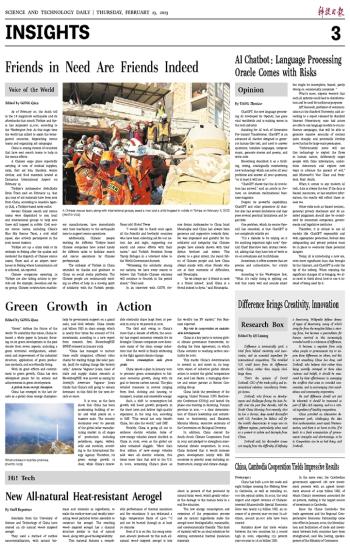
ChatGPT, the new language processing AI developed by OpenAI, has gone vital worldwide and is making waves in the tech industry.
Standing for AI tech of Generative Pre-trained Transformer, ChatGPT is an advanced AI chatbot designed to generate human-like text, and used to answer questions, translate languages, compose music, generate stories and poems, and write code.
Bloomberg described it as a thrilling, vexing, ontologically mesmerizing new technology which can solve all your problems and answer all your questions, "or at least it will try to."
"ChatGPT shows that the AI revolution has arrived," said an article in Fortune, an American multinational business magazine.
Despite its powerful capabilities, ChatGPT and other generative AI chatbot also has several limitations and may pose several practical limitations and legal risks.
One problem, which its creator OpenAI has conceded, is that ChatGPT is not completely reliable yet.
"It's a mistake to be relying on it for anything important right now," OpenAI Chief Executive Sam Altman tweeted, adding that they have lots of work to do on robustness and truthfulness.
Sometimes, it offers answers that are precise and authoritative, but utterly wrong.
According to the Washington Post,"What it's really doing is spitting out text that reads well and sounds smart but might be incomplete, biased, partly wrong or, occasionally, nonsense. "
What's more, experts worried that such AI systems could lead to disinformation and be used for nefarious purposes.
Jeff Hancock, professor of communication at the Stanford University, said according to a report released by Stanford Internet Observatory, once bad actors are able to use language models to run influence campaigns, that will be able to generate massive amounts of content quite cheaply, and potentially develop novel tactics for large-scale persuasion.
"Unfortunately some will use this technology to exploit the flaws in human nature, deliberately target people with false information, undermine democracy and explore new ways to advance the pursuit of evil," said Microsoft's Vice Chair and President Brad Smith.
When it comes to any modern AI tech, data is always the key. If the data is biased, inaccurate, or has sensitive information, the results will reflect those issues too.
Other risks such as biased content,personal privacy disclosure and AI-assisted plagiarism should also be considered by concerned companies, governments and legislative institutes.
Therefore, it is critical to use AI models like ChatGPT responsibly and with appropriate protection. Robust data safeguarding and privacy policies must be in place to overcome these potential dangers.
Today, AI is introducing a new era, even more significant than that brought by the Internet, and ChatGPT is only the tip of the iceberg. When enjoying the significant changes AI is bringing, we also need to think about how to use it instead of being used by it.


 Next
Next




